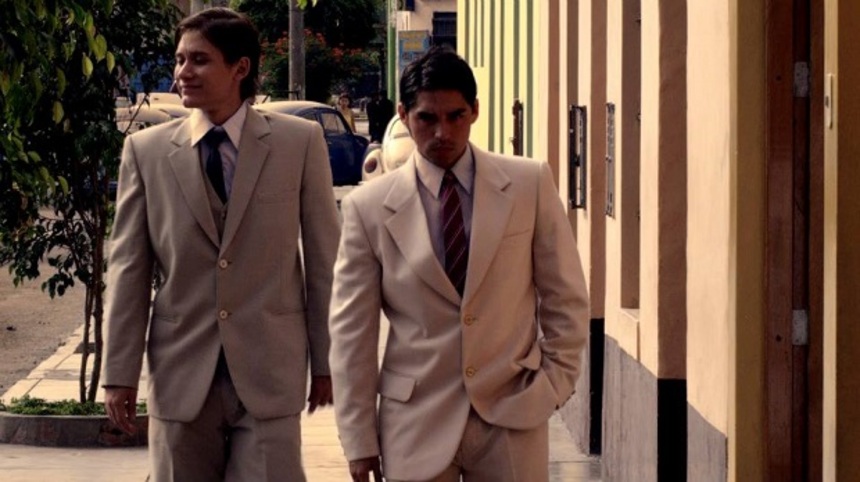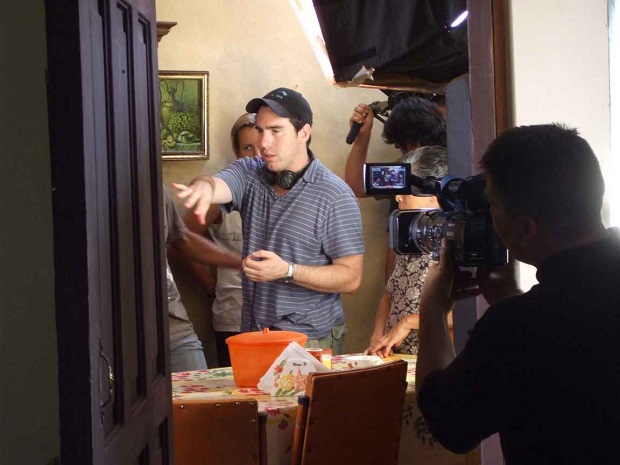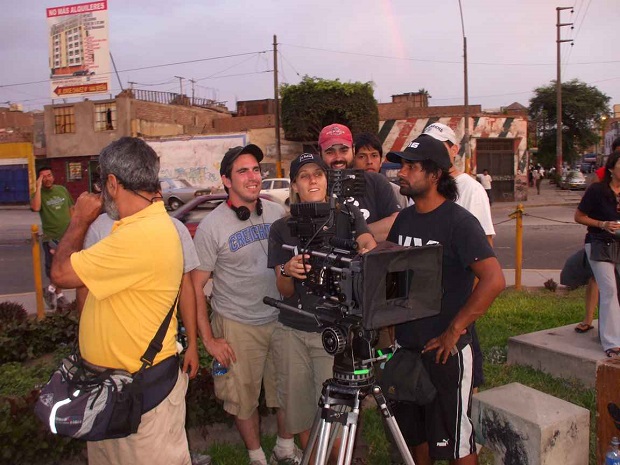Interview: Tom Sanchez Goes Back To His Roots In THE BLADE OF DON JUAN

Walter and Mario are two brothers living in the working class neighborhood of Breña in Lima, constantly at each other's throats over ownership of a knife which used to belong to their late father. An arm wrestling match is the best way to decide the matter, the results of which send them both to an adventure in the city and a house party in the upscale suburb of San Isidro, where the shy, innocent Walter hopes to lose his virginity with the aid of his womanizing older brother.
That's the premise behind The Blade of Don Juan, a dramedy from first-time director Tom Sanchez. Born in Lima, but raised in the United States since the age of eight and now based in California, he completed a Masters in Film and Television Production at USC in 2007, which led to him cutting his teeth on short films and music videos. After realizing that indie videos had limited budgets and can no longer support cutting edge concepts like Nine Inch Nails' Closer, Sanchez was intent on making the jump to full-length films.
Blade was the result, and an opportunity for Tom to reconnect with his roots by filming in his hometown. A casting director helped him find his actors, including leads Rodrigo Viaggio and JC Montoya, who play the bickering brothers and are also friends in real life. The movie was released in Peru in September, and garnered a warm reception from critics and audiences, who were expecting a teen comedy and got something closer to a coming-of-age drama.
With the film being released in North America, it was a perfect time to speak to Tom about the making of the film.
ScreenAnarchy: The Blade of Don Juan is your first time shooting in Peru. What made you decide to film in Lima?
Tom Sanchez: I wanted to prove I could do something in Spanish, but I guess I could have done that anywhere. But, you write what you know, and although I moved away from Lima when I was 8 years old, I kept in touch with my family there, I would visit, and I also have family that moved here from Peru. Even though I moved away physically I still had a lot of connections, culture and stuff. I was trying to figure out something I could do where I had access to locations, and that's mainly why I did it in Peru. The two houses in the movie belong to my family. The main house is where I grew up; it's my grandmother's house, so it's still ours. The other house is my dad's cousin's house, and she let us shoot there for free, for eight days and eight nights, so I was able to get a lot out of that.

How would you compare the experience of filming in the United States with filming in Peru?
The main difference is, and it's not necessarily a bad thing or a good thing, in the US everything's very organized, compartmentalized. For example, here, the grips and the electrics don't mix as far as jobs go. You have to hire electricians and all they do is wiring; and then you have the grips and all they do is the physical part. In Peru it's all mixed together, everything is a little more disorganized and informal, and more chaotic. That's not bad; it's frustrating sometimes, but you get a certain energy out of it. You learn to just stop trying to control everything, work with what you have and adapt. Not that in the US everything you plan for works, shit happens all the time.
Is the movie based on personal experience? One of the things I really liked was that Rodrigo and JC actually feel like brothers. Is there any influence from your own life?
Well, I don't have any brothers. I always wanted a brother when I was a kid, I'm the oldest with two younger sisters, I have some cousins that were close, when I lived in Peru. When I moved away, I kind of lost that. But I do remember, my dad and my uncle are two out of many children, they're right in the middle. They're troublemakers, or they were, my uncle's an eye surgeon in Peru and my dad is a doctor here in the US, so they turned out ok. Even to this day they still interact like they're kids, they revert when they see each other, so I kinda based it on that dynamic, just from my observing them. That's about as personal as it gets.
The stories about Tom's father and uncle informed many scenes in the film, especially the moment when both brothers are seen walking around in Tony Montana-style suits. Sanchez's father has long maintained that he and his brother were walking home from a wedding and were accosted by a street gang. Whether or not the story is true is still up in the air, but for Tom, a story like that was crazy enough to be made into a scene in a film; in fact, the entire idea for the project was born out of that story.

Did you have influence from other movies or other filmmakers? It feels like a very personal film, but I was wondering if you were influenced by other sources.
We wanted to have somewhat of an indie film look, but not an indie film from the US, something with a Latin twist on it. We sat down to make sure that it looked how we felt Lima was, which is colorful but worn out. We were looking at (Fernando Meirelles') City of God, (Alfonso Cuarón's) Y Tu Mamá También, as far as references go. I wouldn't say they have the same exact look, obviously City of God is way more serious, but we were kind of in that space, I think. We knew what we were going for and it just came up through a process, starting with the planning, obviously.
It's a very Peruvian film, but at the same time there's an international feel to it. Have any US-based audiences seen it, and what was their reaction?
As far as actual commercial release, it's hard to say. It's been released on streaming, VOD and DVD, and it's only been out for a month, so not too many people have commented on it; but we played it at film festivals and it's been a really positive experience. It played at Austin, San Francisco, and it played in the Philippines, although I wasn't there, I heard it went well. Austin was definitely one of the best screenings, the premiere went really well, and the second screening was on Halloween night. "It's Halloween, is anyone going to show up?" There are a lot of parties in Austin, and it was downtown, so traffic was bad, but the theatre was really full. I was sitting in the audience next to a guy that kept laughing really loud, an annoying laugh, but he was laughing in the right spots, so that was good. At the end of the movie, when (Rubén Blades' song) Pedro Navaja kicks in, he stood up, started dancing and left. That was probably my favorite audience reaction. I know that when people see it, they'll like it. It's just a question of making people aware of its existence.
The Blade of Don Juan is a particular and personal view of life in the suburbs of Lima, a perspective made fresh by its director's multicultural upbringing. The film is available to rent or buy at this link.
Watch the North American trailer below.






 (1)-thumb-80x80-93563.jpg)
